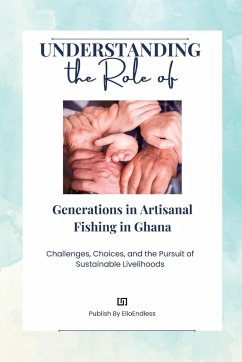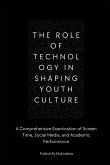Understanding the Role of Generations in Artisanal Fishing in Ghana Subtitle: Challenges, Choices, and the Pursuit of Sustainable LivelihoodsUnderstanding the Role of Generations in Artisanal Fishing in GhanaBook Description In "Understanding the Role of Generations in Artisanal Fishing in Ghana," the intricate dynamics of artisanal fishing and its impact on both the environment and the livelihoods of the people involved are explored. This comprehensive study delves into the critical issue of declining fisheries and the delicate balance between effort controls and their repercussions on the artisanal Ghanaian fishers.Key Insights1. Balancing Act of Effort ControlsExamines the positive and negative effects of effort controls on fishers' livelihoods. Highlights the challenges and consequences when controlling efforts leads to the exclusion of fishers from the declining fishery. 2. Fishers' Willingness to ExitInvestigates the factors influencing artisanal Ghanaian fishers' willingness to exit a declining fishery. Explores perceived alternative livelihood options and the reasons behind their choices. 3. Generations in FishingIdentifies "generations in fishing" as a major factor influencing fishers' decisions to exit or remain in the fishery. Discusses the impact of family background and heritage on fishers' commitment to their craft. 4. Effort Reduction ChallengesHighlights the study's findings that direct effort reduction may face resistance, with fishers reluctant to exit or likely to return to fishing without proper control measures. 5. Recommendations for Sustainable SolutionsProposes indirect means, particularly addressing the influence of "generations in fishing," to achieve successful effort reduction. Advocates for government support in promoting alternative livelihoods to reduce overdependence on the declining fishery. 6. Promoting Alternative LivelihoodsEmphasizes the importance of promoting alternative livelihoods among fishers. Identifies preferred alternative livelihoods based on the fishers' educational background and skill levels. 7. Government InterventionRecommends government support for alternative livelihoods, targeting those forced into the fishery and feeling trapped. Advocates for policies aimed at eliminating or reducing intergenerational transfer of fishing within households. Preface Excerpt One of the major ways to reduce pressure on a declining fishery is through effort controls, which often have both positive and negative effects on the people whose livelihoods depend on the fishery. This study focuses on artisanal Ghanaian fishers in an urbanized and developed area like Tema, examining their willingness to exit a declining fishery and identifying alternative livelihood options. The findings emphasize the significance of addressing "generations in fishing" and promoting alternative livelihoods to achieve sustainable solutions. The study recommends government support and targeted policies to break the cycle of intergenerational fishing dependence. Artisanal Fishing;Ghana;Fishery Decline;Effort Controls;Generations in Fishing;Alternative Livelihoods;Sustainable Solutions;Fishers' Willingness;Urbanized Fisheries;Tema, Ghana;Family Heritage;Overdependence;Government Support;Intergenerational Transfer;Educational Policies;Effort Reduction;Livelihood Options;Environmental Impact;Fishing Dynamics;Policy Recommendations
Hinweis: Dieser Artikel kann nur an eine deutsche Lieferadresse ausgeliefert werden.
Hinweis: Dieser Artikel kann nur an eine deutsche Lieferadresse ausgeliefert werden.








